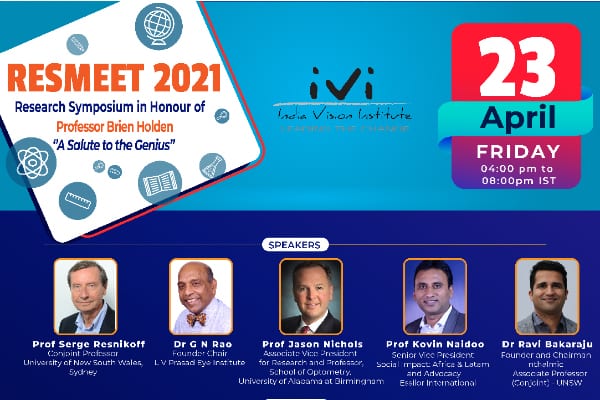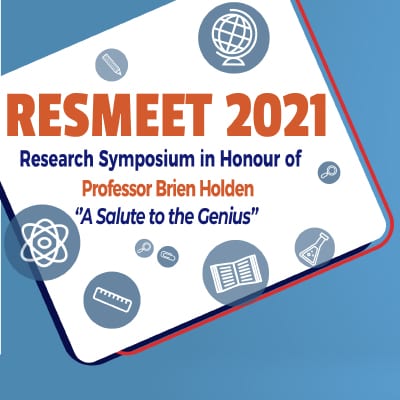Research Can Drive Evidence-based Optometry Practice To Help Millions Of Indians Access Quality Vision Care
India Vision Institute’s research symposium RESMEET 2021, on April 23, saw participation from prominent global researchers, practitioners, and eye health policy luminaries. Keynote speakers such as Ms Yvonne Holden, who made the opening remarks, Dr G N Rao, Prof Serge Resnikoff, Prof Kovin Naidoo, Dr Ravi C Bakaraju, and Prof Jason J Nichols gave inspiring talks and presentations.
RESMEET was held in honour of late Professor Brien Holden and commemorated his life, career and achievements. Known as the most influential optometrist of our generation, Professor Holden’s career has served as an inspiration for scientists and health care professionals around the world, and his dream of ‘vision for everyone, everywhere,’ resonates in today’s world as much as it ever has.
In line with Brien Holden’s vision of making India an optometry research hub for the world, a theme that figured prominently in the RESMEET 2021 discourse was the need to enhance both numbers and quality of Indian optometry research. A panel discussion, ‘India on the Global Vision Research Map,’ chaired by IVI’s CEO, Vinod Daniel, brought together key thought leaders, researchers and clinicians in optometry, such as Dr Shrikant Bharadwaj, Dr Priya Morjaria, Dr Jameel Rizwana H, Dr Premnandhini S, and Dr Ramesh S Ve.
Research and clinical practice are twin engines propelling the growth of optometry. Neither can function efficiently in the absence of the other. For patients to benefit from evidence-based vision care solutions, clinical practitioners need to rely on contemporary research, and for research to stay relevant, research questions and objectives should be framed keeping in mind the demands of patients and clinical practice. This interdependence means that a continuous learning loop is vital to ensure the flow of knowledge, leading to better results, both for the optometry profession and humanity at large.
Unfortunately, panelists felt, the learning loop between research and clinical practice has not been harnessed to its full potential. Few optometrists in India undertake practice based on the latest scientific evidence. A fact that came to the fore at the discussion was that only a small fraction of the world’s top optometry and ophthalmology researchers are Indian. A dearth of research has been an obstacle to evidence-based clinical practice in the country. However, there is no dearth of research questions in a nation as large and as diverse as India. According to Dr Jameel Rizwana H, research questions are born in the clinics and in the community. “There are so many problems to attend to, be it myopia, presbyopia, or visual impairment during the productive years of life, there is no shortage of problem statements a researcher could focus on,” she noted. India’s research potential can be tapped to its fullest only when quality education and the right kind of academic environment is provided. The new National Education Policy, with its prioritization of research and scientific inquiry, could prove to be a positive step in this direction.
Vinod Daniel drew the panelists’ attention to the reforms introduced in the country through the National Commission for Allied and Healthcare Professions Act, 2021, noting that optometry is a young profession in India, one that is only beginning to get shape and structure. Given that Indian optometry is still finding its feet, Mr Daniel asked the panelists whether vision care research has a place in this fledgling field. “Without research, any field becomes stagnant and stagnation leads to decay. The only way to prevent that is through research. If there is optometric education, there is always space for research to happen,” Dr Premnandhini S remarked. According to Dr Shrikant Bharadwaj, many international peer-reviewed journals are looking for unique research coming from the Indian subcontinent. Despite the fact Indian researchers have not contributed substantially to the body of eye health research so far, it is never too late to start and Indian researchers should rise to the occasion and send their research to international peer-reviewed journals for publication. Dr Premnandhini said the quality of research papers ought to be more important than their sheer numbers.
Brien Holden’s vision of India attaining the goal of a thousand PhD-holders in eye health should inspire young scholars in the country to take up research. “How do we approach this as a country? What are the steps we should take to ensure that India reaches the goal of having 1,000 PhD-holders in eye health research?” Mr Daniel asked, requesting panelists to identify the prerequisites for a strong research environment in the country. Dr Priya Morjaria highlighted the value of mentorship for PhD-level research. “Quality mentorship is the place to start. If the right mentorship can be put in place, there already are a number of strong institutions in India that can help researchers, and there is no dearth of research questions in the country. Having good mentorship programs would be a key step,” she observed. “What is lacking is a research culture with a drive to advance optometry in India,” argued Dr Ramesh S Ve, “There has to be a strategic approach, which could be led by a collaboration between different institutions, to identify and train PhD mentors who can then establish a research ecosystem. The thrust of this research ecosystem should be towards answering questions that are relevant both nationally and globally, which would, in turn, incentivize students to opt for research careers,” he added. Partnerships between research institutions and industry can create a sustainable research ecosystem and produce cost-effective and efficacious solutions.
Mr Daniel and the panelists dispelled the misconception that aiming for a world-class research environment in the country is incompatible with a focus on solving fundamental problems such as the prevalence of uncorrected refractive error. Evidence-based practice is the way to solve the vision health challenges India faces. When reliable and relevant evidence is generated by researchers, practitioners can draw on the best available knowledge to give vision care solutions to the public at large. Optometry research can play a pathbreaking role in India’s fight against preventable blindness. Researchers can, in their own way, contribute greatly to improving the quality of life for millions of Indians.








